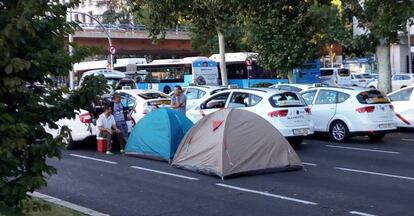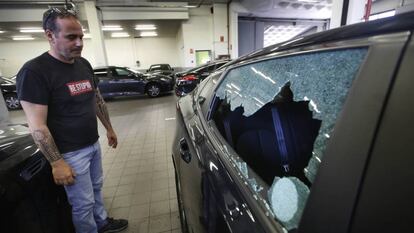Taxis camp out in central Madrid as strike intensifies
Drivers have set up tents along Paseo de Castellana in protest over ride-hailing services like Uber

Hundreds of taxi drivers on Tuesday blocked one of Madrid’s main thoroughfares, Paseo de la Castellana, in an ongoing protest against what they view as unfair competition from ride-hailing services like Uber and Cabify.
Following an unsuccessful meeting between taxi representatives and government officials on Monday, taxi associations decided to maintain their nationwide stoppages. Last night, dozens of drivers in Madrid decided to camp out between Gregorio Marañón Square and Nuevos Ministerios. On Tuesday morning, there was only one free lane going each way on Paseo de la Castellana, as well as the bus lane.
Algunos taxistas no se han movido de su sitio desde las diez de la mañana de ayer lunes. Esperan seguir hasta que Fomento explique el acuerdo al que ha llegado con las VTC https://t.co/EajXsiGNRl pic.twitter.com/luo0stjR8a
— Julio Núñez M (@jnunez_mo) July 31, 2018
Some of the taxi drivers have not left their spot since 10am on Monday. They are waiting for the Public Works Ministry to explain what agreement has been reached with the VTC
The street protest mirrors similar demonstrations in Barcelona, where around 1,500 drivers have spent four straight nights in tents on Gran Vía and Paseo de Gracia. The action comes during peak tourist season in Spain.
“We are not budging from here until this week’s meetings are over. They have to see that we are still on the streets and that the pressure is going to keep up. This sector is not going home with a piece of candy,” said Luis López, a spokesman for the National Taxi Association.
We are not budging from here until this week’s meetings are over
Luis López, National Taxi Association
On Monday, taxi drivers were unconvinced by the “insufficient and vague” measures proposed by the Public Works Ministry to limit the number of operating licenses that may be awarded to ride-hailing services. These companies operate under VTC (chauffeured rental vehicle) permits, and the taxi sector wants to enforce legislation that says only one VTC license may be awarded for every 30 taxi licenses.
On Tuesday, State Secretary for Infrastructure, Transportation and Housing Pedro Saura will meet with VTC associations to hear their own demands. On Wednesday there is a scheduled meeting of the National Transportation Conference, which will also address the escalating confrontation.
Eduardo Martín, president of Unauto, the association that represents VTC companies, on Monday described taxi drivers’ attitude as “extortion” and said they are doing this because they “don’t want competition.” Unauto has also reported acts of violence against drivers of ride-hailing companies and damage to their vehicles.
Roots of the conflict
The simmering conflict between taxi drivers and ride-hailing services blew up last week in Barcelona, where Mayor Ada Colau attempted to set limits on VTC operations. Colau’s initiative would have forced VTC drivers to obtain a second license, and these new permits would have reduced the number of VTC vehicles in the Barcelona metropolitan area down to 400 from the current 1,035.

But the National Markets and Competition Commission (CNMC) challenged the decision, and Catalonia’s regional high court placed her regulations on hold, on the basis that they were encroaching on powers that legally fall to the Spanish state. The taxi sector in Barcelona responded by going on an indefinite strike on Saturday. The stoppage has since spread to Madrid, and partly to Valencia, Alicante, Seville, Málaga, Zaragoza, as well as several municipalities in the Basque Country and La Rioja.
There are currently 9,366 VTC vehicles and 65,277 taxicabs operating in Spain, representing a 1-7 ratio. This is higher than the 1-30 ratio established by a 2015 decree on transportation. Madrid has the most ride-hailing vehicles, 4,308, followed by Barcelona with 1,363.
The price of a license
In June 2017, in Madrid, taxi drivers looking to retire were running ads offering their licenses for anywhere between €150,000 and €170,000. The ads for VTC vehicles offered licenses for around €40,000.
There are a further 10,000 VTC licenses slowly going on the market that were issued between 2009 and 2013, when the Socialist administration of ex-prime minister José Luis Rodríguez Zapatero passed legislation to liberalize the economy and eliminated all caps on VTC licenses. These permits are being released through court rulings.
The competition oversight body, CNMC, feels that the 2015 decree setting out a 1-30 ratio “limits competition, is unnecessary and disproportionate, and ends up hurting the final consumer.”
English version by Susana Urra.
Tu suscripción se está usando en otro dispositivo
¿Quieres añadir otro usuario a tu suscripción?
Si continúas leyendo en este dispositivo, no se podrá leer en el otro.
FlechaTu suscripción se está usando en otro dispositivo y solo puedes acceder a EL PAÍS desde un dispositivo a la vez.
Si quieres compartir tu cuenta, cambia tu suscripción a la modalidad Premium, así podrás añadir otro usuario. Cada uno accederá con su propia cuenta de email, lo que os permitirá personalizar vuestra experiencia en EL PAÍS.
¿Tienes una suscripción de empresa? Accede aquí para contratar más cuentas.
En el caso de no saber quién está usando tu cuenta, te recomendamos cambiar tu contraseña aquí.
Si decides continuar compartiendo tu cuenta, este mensaje se mostrará en tu dispositivo y en el de la otra persona que está usando tu cuenta de forma indefinida, afectando a tu experiencia de lectura. Puedes consultar aquí los términos y condiciones de la suscripción digital.








































